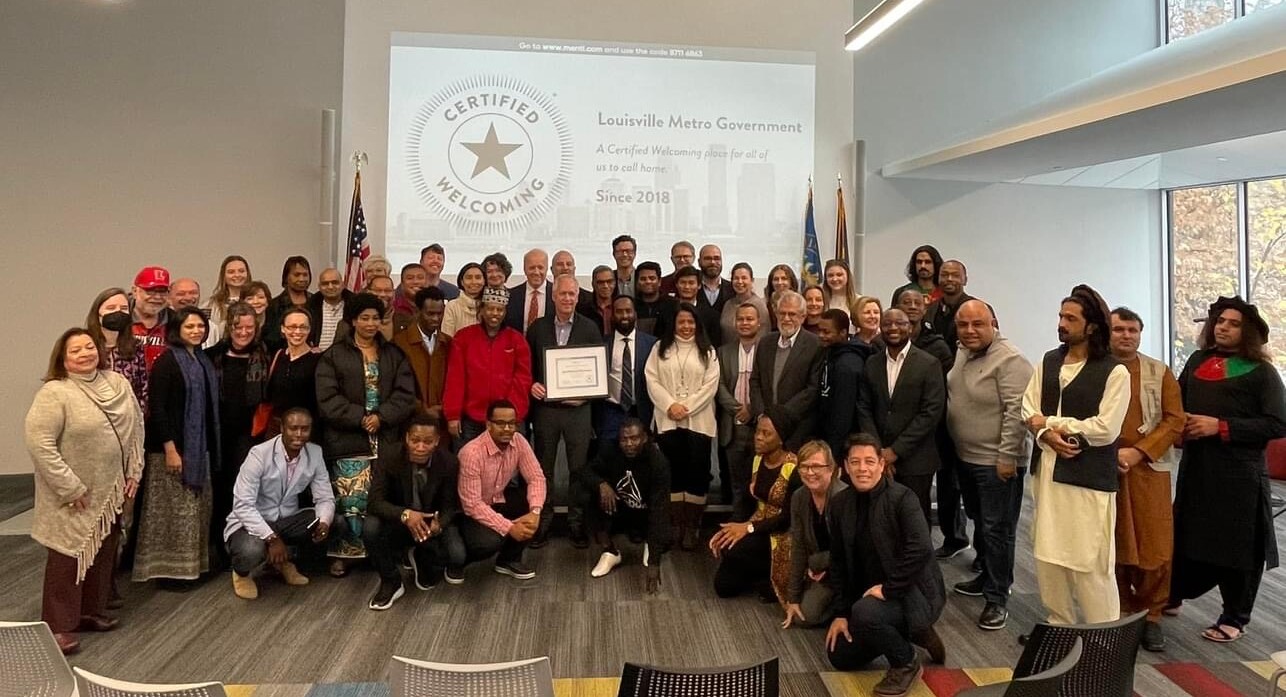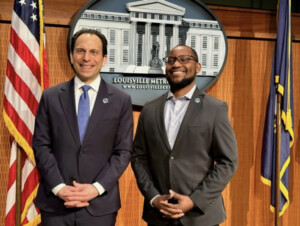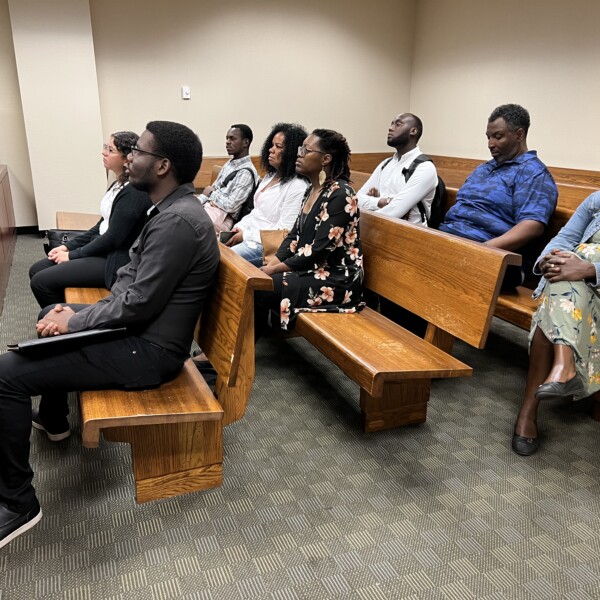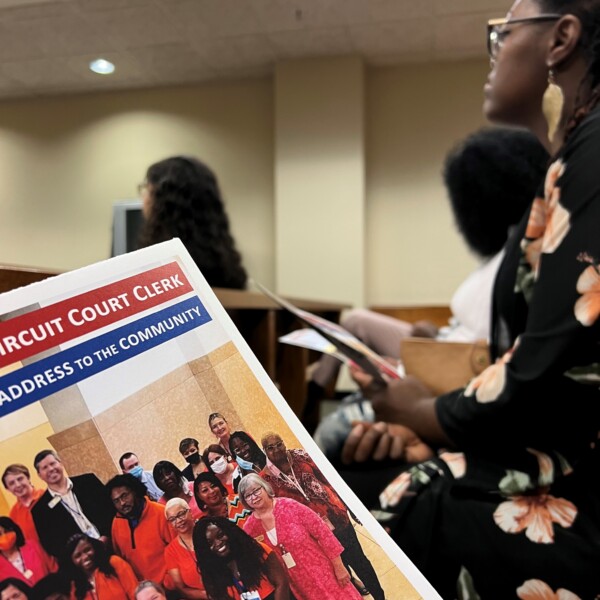
Partnerships and welcoming infrastructure guide Louisville’s welcoming work
The Louisville Metro Government in Kentucky became Certified Welcoming in 2018 and recertified in 2022. Amos Izerimana, Director of Louisville’s Office for Immigrant Affairs, spoke with us about how recertification was an opportunity to reflect on partnerships and infrastructure that have advanced Louisville’s immigrant inclusion work.
Collaborations make welcoming work possible
Over the last decade, Louisville’s immigrant population has grown rapidly. To Amos Izerimana, Certified Welcoming is an important distinction for the city because it demonstrates the community’s long-term efforts and pride in being an inclusive, welcoming community for newcomers.
“It’s important to recognize the welcoming nature of the city: not just the local government, but all the various institutions and entities that help our residents thrive,” says Izerimana.

Louisville Mayor Craig Greenberg (left) and Amos Izerimana, Director of Louisville’s Office for Immigrant Affairs (right). Credit: Louisville Metro Government
Izerimana’s role as director of the Louisville Office for Immigrant Affairs is vital for shaping the inclusive, multicultural community that Louisville strives to be. However, he cannot do this work alone. The recertification process offered an opportunity for the local government to reflect on how partnerships help the city engage with immigrant and refugee communities.
While the Office for Immigrant Affairs led recertification, community partners were essential leaders and contributors to the city’s welcoming work and were key inputs during the Certified Welcoming audit. Some community stakeholders shared that they didn’t feel that they had any value to add to the recertification process, but Izerimana reassured them that their contributions were critical to advancing the city’s welcoming efforts.
“The most affirming aspect of recertification was being able to identify some of the partners that are working on specific initiatives that we identified in our self-assessment. It helped us have a holistic view of all the stakeholders, both within metro government and throughout the city,” he shares. “While our office may be small, with just two full-time employees, we have extensions throughout the city to help make our work successful.”
Developing the skills of newcomer leaders
The Global Louisville Leadership Academy, formerly known as the Louisville Welcome Academy, is one of the Office for Immigrant Affairs’ foundational welcoming programs. The academy is a free training program for newcomers—as well as long-time residents who work primarily with immigrant and refugee populations—to increase their leadership capacity to better serve their communities.
Over six months, academy participants deepen their knowledge of city government services, citizenship and civic engagement, public safety and the court system, and community engagement. In the past, the program also collaborated with the national organization New American Leaders to offer training for immigrant participants who wanted to run for office.
- Credit: Louisville Metro Government
- Credit: Louisville Metro Government
Since 2017, over 120 leaders have graduated from the Global Louisville Leadership Academy. This large network has enhanced the city’s ability to connect with and respond to the needs of international newcomers. This proved especially valuable during the COVID-19 pandemic as Louisville worked to engage with immigrant and refugee communities.
“Through the recertification process, we realized there was an opportunity to enhance this program and create an active engagement with our academy graduates,” says Izerimana. “We were able to create a community ambassador program to respond to the pandemic. The trusted ambassadors helped the city reach all residents by sharing information about testing and vaccination, as well as addressing misinformation.”
Furthermore, the Global Louisville Leadership Academy participants provided a community space during times when connection and conversation were needed most. During the nationwide racial justice protests and demonstrations in 2020, a recent participant in the academy cohort formed a discussion group for Black immigrants and non-immigrants to discuss current events. The conversations were originally facilitated by the Office for Immigrant Affairs and convened mostly young people from immigrant backgrounds.
Izerimana reflects that these discussions were a critical opportunity to listen to the voices of Louisville’s international population about what it means to achieve racial and social justice. “I think it really encouraged many young, Black immigrants to learn more about the history of Black Americans in the country,” he says.
Equitable access and civic engagement in action
One area for improvement identified during the Certified Welcoming audit was Louisville’s language access plan. Izerimana explains that language access is central to achieving equity and inclusion because it ensures that anyone who wishes to access government and city services can.
To promote the importance of language access, the Office for Immigrant Affairs worked with community members and local organizations who could share firsthand experiences of how a lack of translation and interpretation services impacted them. These individuals and organizations testified at a city council meeting to gain support from council members in expanding language access services.
One of the Office for Immigrant Affairs’ partners, Americana World Community Center, shared the many benefits they’ve witnessed throughout their experience providing language services. Furthermore, several community members described how language services would have helped them better navigate distressing events, such as family conflicts, medical appointments, and instances of domestic violence.
“It was important to share some of those more sensitive situations where language access is essential so that those who are providing services understand how vital it is to have this infrastructure,” Izerimana says.
A fundamental goal of this act of civic engagement was to persuade city decision-makers to invest funding in language services.
“I think the default response is that it’s going to cost us a lot of money,” remarks Izerimana. “But how much is this going to cost us if we don’t provide the service? Our goal is to reduce significant impacts to the community so that everyone feels safe, seen, and like a contributor to our city’s economy.”
What’s next for Louisville?
Izerimana says that he is encouraged by the support from the city’s leadership. Until early 2023, Louisville’s Office for Immigrant Affairs was known as the Office for Globalization. Originally housed under the Department of Economic Development, the office was recently elevated into the new mayor’s office as part of the city’s ongoing equity work. With its new name, the Office for Immigrant Affairs is excited to specifically acknowledge newcomers, their needs, and the experiences that they bring to Louisville.
Building the infrastructure for community ambassadors and growing the Global Louisville Leadership Academy are the city’s top goals moving forward. After observing the benefits of working with academy participants and graduates, prioritizing the city’s connections with these local leaders will be a major asset for Louisville’s ongoing newcomer engagement.
As the city’s international population grows, the community has seen an increasing number of immigrant- and refugee-owned businesses. Fully aligning the city’s efforts with the economic development framework in the Welcoming Standard is another aspiration for Louisville.
“We have made significant strides with our small business programs to engage immigrant small business owners, and we hope to build upon that work so there’s a robust ecosystem for immigrant businesses,” Izerimana says.
To any communities considering becoming Certified Welcoming, Izerimana says, “Do it! The Welcoming Standard is a great framework to start building a welcoming agenda for a city of any size. It will help the city government structure its priorities, but also the wider community to envision what the city’s welcoming environment could look like.”
Louisville is eligible for recertification in three years. In the meantime, the city’s Office for Immigrant Affairs is eager to continue using the Welcoming Standard and Certified Welcoming to benchmark its immigrant inclusion efforts.

